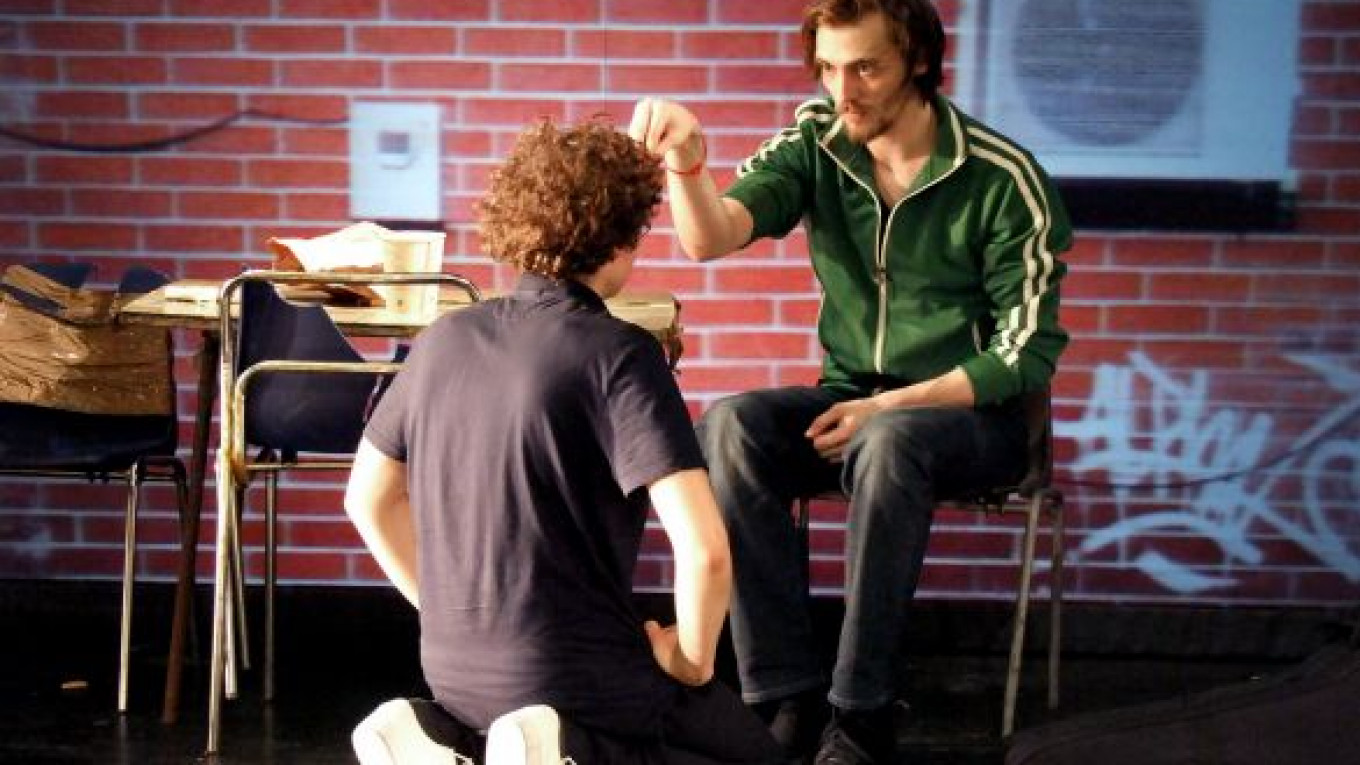It's quite a simple play, Adrian Giurgea says about Annie Baker's "The Aliens." It asks the question, "How can we save our souls when life overcomes us?"
As simple as that.
Giurgea, a Romanian-born, United States-based director, makes his Moscow directing debut this weekend at the Pushkin Theater affiliate with Baker's play, one that helped establish her as one of the top young American playwrights.
"She belongs to an exceptional generation of playwrights who really know how to write for the stage," Giurgea declares, adding the names of Amy Herzog and David Adjmi into the mix. These are "very good, professional, young" writers who see theater as their "primary means of expression," not as a way to transition to television or feature films.
"The Aliens" is still quite new. It premiered in New York in 2010 and now, after a Russian premiere at the Fifth Theater in Omsk this spring, it is ready to hit Moscow in a "brave, intelligent" adaptation by Russian playwright Mikhail Durnenkov, as Giurgea puts it.
That Omsk production, incidentally, plays in Moscow at Project Otkrytaya Stsena on Sept. 25.
"The words are still Annie's," Giurgea says about Baker's play, "but somehow they are now Russian. It is an American story that resonates well with Russians, like 'Catcher in the Rye.' It is a universal, timeless story of discontent, doubt and hope."
Both Baker's and Giurgea's foray into Russia will continue later this season when the latter presents the former's Obie award-winning play, "Circle Mirror Transformation" at the Moscow Art Theater.
Russia, at least Russian theater, has been a strong influence in Giurgea's life, although it took him awhile to make the realization.
He was born in Bucharest, Romania, in 1954 and had early hopes of being a poet.
"I wanted to be a poet all my youth, with some successful attempts," he explains. "But that ended when I found theater, which embraces poetry and other means of communication."
Studying at the Bucharest Conservatory after apprenticing at the famed Tandarica puppet theater under Margaret Niculescu, Giurgea began soaking up Russian influences. "Chekhov, Sukhovo-Kobylin, even Turgenev from the classics and Arbuzov, Kataev and others from the 20th century were all part of our theatrical tradition." Alexander Vampilov, the upstart playwright of the 1960s and early 1970s was "a breath of fresh air" for the young director.
In the 1970s, however, a powerful generation of Romanian theater directors abandoned their homeland, going into emigration. It left theater artists like Giurgea feeling bereft, and he followed them west in 1982.
He went, as he puts it, to "hone" his directing skills.
"I apprenticed too long," he admits. "Even after emigration I kept putting myself on the path of education."
That meant, however, that he amassed some impressive credentials. He assisted Liviu Ciulei in Europe, Robert Wilson in the United States and Giorgio Strehler in Italy, each one of whom can rightfully lay claim to the epithet of "legendary."
In the United States Giurgea began a working relationship with Danila Korogodsky, a Los Angeles-based designer whose father was a famous Russian theater pedagogue. This led in the early 2000s to a meeting with Dmitry Krymov, at that time a Russian painter and ex-theater designer on the verge of changing his professional course drastically. Krymov shared ideas with Giurgea for his impending first production as a director, an interpretation of "Hamlet" at Moscow's Stanislavsky Theater that set off a chain of events leading to Krymov's emergence as one of Russia's top directors.
"One day I got a call from Moscow and Krymov asked me to come play the Fool in 'King Lear,'" Giurgea says. "I told him I don't speak Russian. He said 'You'll learn.' I said I don't act. He said, 'You'll learn.'
Giurgea subsequently spent two years in Moscow rehearsing and performing in Krymov's "Three Sisters," an adaptation of "Lear," at the School of Dramatic Art.
"I've never received such good reviews as a director as I did as an actor," he laughs, then adds that it was his collaboration with Krymov that jumpstarted his work in Russia. Productions in St. Petersburg and Samara followed. Now he brings Annie Baker to Moscow in a big way in this 2012-13 season.
"My job as a director is to not kill this fragile play," he smiles in regards to "The Aliens." "I am not imposing myself on the play, my job is to find life in all the fragility of its words."
"The Aliens" opens Sat. and Sun. and continues in repertory indefinitely.
A Message from The Moscow Times:
Dear readers,
We are facing unprecedented challenges. Russia's Prosecutor General's Office has designated The Moscow Times as an "undesirable" organization, criminalizing our work and putting our staff at risk of prosecution. This follows our earlier unjust labeling as a "foreign agent."
These actions are direct attempts to silence independent journalism in Russia. The authorities claim our work "discredits the decisions of the Russian leadership." We see things differently: we strive to provide accurate, unbiased reporting on Russia.
We, the journalists of The Moscow Times, refuse to be silenced. But to continue our work, we need your help.
Your support, no matter how small, makes a world of difference. If you can, please support us monthly starting from just $2. It's quick to set up, and every contribution makes a significant impact.
By supporting The Moscow Times, you're defending open, independent journalism in the face of repression. Thank you for standing with us.
Remind me later.







